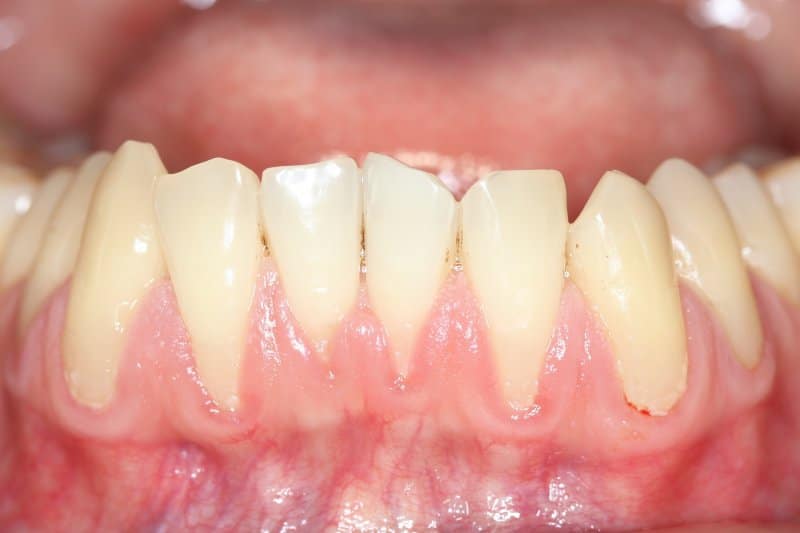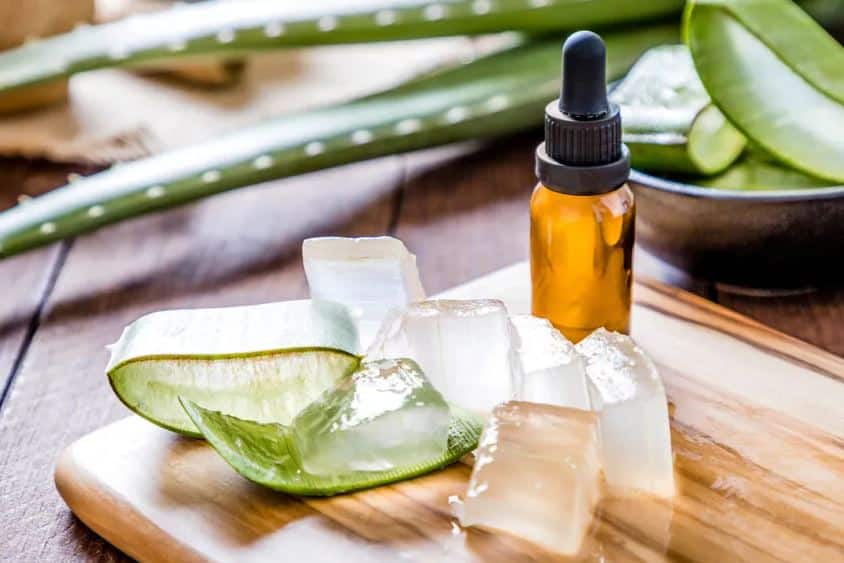Gum recession is a common dental problem when the gum tissue pulls back from the teeth, resulting in exposure to the roots. If left untreated, it can cause tooth sensitivity, decay, and even tooth loss. Although it is commonly associated with aging, gum recession may also be caused by poor oral hygiene habits, aggressive brushing, grinding or clenching of teeth, hormonal changes during pregnancy or menopause, and certain medical conditions such as diabetes. Fortunately, several Home Remedies For Gum Recession are extremely effective in reversing receding and promoting healthy gums.
As dental health experts and hygienists, we understand how important it is to maintain optimal oral health for overall well-being. We recognize that many people seek natural solutions for their dental problems due to concerns about the potential side effects of conventional treatments or simply because they prefer a more holistic approach. In this article, we will explore some effective home remedies for gum recession that have been scientifically proven to work. These remedies range from simple lifestyle changes to herbal remedies and require minimal effort but can significantly prevent further damage to your gums. By incorporating these remedies into your daily routine, you can take control of your dental health and achieve healthier gums naturally.
Understanding The Causes Of Gum Recession
Gum recession is a common dental problem that affects many people worldwide. It occurs when the gum tissue surrounding teeth pulls back or wears away, exposing more of the tooth root. Gum recession can lead to tooth decay and even loss if left untreated.

One of the primary causes of gum recession is genetics. Some individuals are born with thinner or weaker gum tissues, making them more susceptible to receding gums than others. Additionally, smoking has been identified as one of the most significant risk factors for developing gum disease, which often leads to gum recession.
Symptoms of gum recession include tooth sensitivity and appearance of teeth. If you notice these symptoms, seeing your dentist as soon as possible is essential. They can diagnose any underlying oral health problems and develop an appropriate treatment plan before further damage occurs.
Identifying The Symptoms Of Gum Recession
Understanding the causes of gum recession in 20s is essential in preventing its occurrence. Gum recession occurs when the gums begin to recede, exposing the roots of the teeth. If left untreated, this can lead to tooth sensitivity, pain, and even tooth loss. Some common causes of gum recession include brushing too hard or using a toothbrush with stiff bristles, periodontal disease, genetics, hormonal changes in women, and smoking.
Preventing gum recession involves maintaining good oral hygiene practices such as brushing twice daily and flossing daily. It is also essential to use a soft-bristled toothbrush and avoid aggressive brushing techniques that can cause damage to the delicate gum tissue. Additionally, regular visits to the dentist for check-ups and cleanings are crucial in detecting any signs of gum recession early on.

If you already have gum recession, several treatment options are available depending on your condition’s severity. These may include scaling and root planing (deep cleaning), antibiotics to treat infection, surgical procedures such as grafting or flap surgery, or orthodontic treatment to correct misaligned teeth contributing to gum recession. Your dental professional will evaluate your situation and recommend an appropriate course of action based on their findings.
Maintaining Good Oral Hygiene Habits
Good oral hygiene habits are essential in preventing gum recession, cavities, and other dental problems. Brushing your teeth twice daily with fluoride toothpaste is an excellent way to maintain oral health. However, proper brushing technique is also essential. You should brush for at least two minutes each time, using circular motions and gentle pressure.
Flossing is another critical aspect of maintaining good oral hygiene habits. Flossing helps remove food particles that can get stuck between the teeth, which may lead to plaque buildup if not removed. Different flossing techniques are available, such as the traditional method or water flossers. Regardless of the technique used, it is essential to floss at least once a day to keep gums healthy.
Use fluoride mouthwash after brushing for added protection against cavities.
Consider purchasing an electric toothbrush with a timer function to ensure adequate brushing time. Try incorporating interdental brushes into your daily routine for extra cleaning between teeth that regular floss cannot reach.
Reducing Stress And Teeth Grinding
Maintaining good oral hygiene habits is crucial in preventing gum recession. However, reducing stress and teeth grinding are also essential factors to consider. Stress can cause muscle tension, leading to clenching or grinding of the teeth, which can contribute to gum recession.
Meditation techniques have been found to reduce stress levels effectively. Meditating for just a few minutes daily can help lower cortisol levels – the hormone responsible for stress-related adverse effects on our bodies. Practicing mindfulness meditation, deep breathing exercises, or yoga can make it easier to manage stressful situations and ultimately prevent damage caused by teeth grinding.

Another way to prevent damage from teeth grinding is by wearing mouthguards at night. Mouth guards act as a protective barrier between your upper and lower jaws, cushioning them during sleep and reducing pressure on your gums. This helps prevent abrasive chewing forces that may lead to receding gums over time.
Benefits of Meditation Techniques
| Benefit | Description |
|---|---|
| Decreased Anxiety | Meditation reduces anxiety symptoms such as nervousness, worry, or panic attacks |
| Improved Concentration | Regular meditation improves focus and cognitive function |
| Reduced Insomnia | By calming the mind-body connection through relaxation techniques like guided imagery or progressive muscle relaxation |
Reducing stress and teeth grinding are essential steps toward maintaining healthy gums. Incorporating meditation techniques into your daily routine and using mouthguards when needed will go a long way in ensuring optimal dental health outcomes for years. Remember that taking care of your oral hygiene is about avoiding cavities and keeping your gums healthy!
Using Essential Oils As Home Remedies For Gum Recession
Maintaining good oral hygiene is crucial for preventing gum recession, which can lead to tooth loss and other dental problems. While regular brushing and flossing are effective methods, some people prefer using essential oils as a natural remedy for gum health. Essential oil combinations are beneficial in reducing inflammation, promoting blood circulation, and fighting harmful bacteria.
Here are four DIY mouthwash recipes that incorporate essential oils:
- Peppermint Mouthwash: Combine 2 drops of peppermint oil, 1 teaspoon of baking soda, and 1 cup of water.
- Tea Tree Oil Mouthwash: Mix 2 drops of tea tree oil with 1 tablespoon of coconut oil and swish it around your mouth for about a minute before spitting it out.
- Cinnamon Clove Mouthwash: Add 2 drops each of cinnamon and clove oils to warm water (not boiling) and a pinch of sea salt.
- Lemon Eucalyptus Mouthwash: Blend 5 drops each of lemon eucalyptus and grapefruit seed extract with ¼ cup of distilled water.
It’s important to note that while these homemade remedies may benefit gum health, they should not replace professional dental care. It’s always best to consult a dentist or dental hygienist before trying any new oral care routine.
Applying Aloe Vera Gel For Gum Healing
Gum recession is a common dental problem that can lead to tooth sensitivity, root decay, and even tooth loss. It occurs when the gum tissue around the teeth pulls back or wears away, exposing more of the tooth’s surface or root. This condition often goes unnoticed until it reaches an advanced stage where treatment becomes necessary.

One natural remedy for gum recession is applying Aloe vera gel directly on the affected area. Known for its anti-inflammatory properties, Aloe vera benefits include reducing swelling in the gums and promoting healing. Its antibacterial agents also help fight off harmful bacteria contributing to gum disease.
But precautions should be considered before using Aloe vera as a home remedy for gum recession. While generally safe, some people may experience allergic reactions such as rash or itching. Additionally, excessive use of Aloe vera gel can cause irritation or damage to oral tissues. As with home remedies or treatments, it is essential to consult a dental professional before trying them out.
Incorporating Vitamin C Into Your Diet
Continuing with gum recession, another effective home remedy to consider is incorporating Vitamin C into your diet. This essential nutrient is crucial in maintaining healthy gums and teeth by aiding collagen production. Collagen is a protein that forms the basis of connective tissue, which includes our gums. Without adequate levels of Vitamin C, our gums become more prone to inflammation and bleeding.
You must first incorporate natural sources into your diet to ensure you get enough Vitamin C. Citrus fruits such as oranges, lemons, limes, grapefruits, and kiwis are all excellent sources of this nutrient. Other food sources include strawberries, papayas, bell peppers, broccoli, tomatoes, and leafy greens like spinach and kale. Adding these foods to your meals regularly can help boost your Vitamin C intake.
Seeking Professional Treatment For Severe Cases
When home remedies fail to alleviate gum recession, it is time to consider seeking professional treatment. Several options are available for patients facing severe cases of receding gums. Understanding when self-treatment is insufficient and when a dentist or periodontist needs to be consulted is essential.

One of the most common treatments for gum recession is scaling and root planing (SRP). This procedure removes plaque and tartar from above and below the gum line, smoothing out any rough spots on the roots that might attract bacteria. SRP can help reduce inflammation, promote healing, and prevent further damage to your teeth and gums. However, surgical intervention may be necessary in more advanced cases where there has been significant bone loss around the tooth due to periodontal disease.
Frequently Asked Questions
Can Gum Recession Be Reversed Completely With Home Remedies?
Gum recession, a common dental problem, occurs when the gum tissue surrounding the teeth wears away or pulls back, resulting in tooth root exposure and sensitivity. While there are various ways to treat this condition, regrowing gums naturally is possible with proper oral hygiene practices at home. Preventing gum recession at home involves regular brushing and flossing to remove plaque buildup that can cause inflammation and damage to the gums. Additionally, using an antibacterial mouthwash can kill bacteria that lead to gum disease. Although home remedies may alleviate symptoms of mild gum recession, complete reversal requires professional intervention from a dentist or periodontist who may recommend surgical procedures such as grafts, scaling, and root planing for severe cases.
Are There Any Specific Foods Or Drinks That Can Worsen Gum Recession?
Gum recession is a common dental problem when the gum tissue surrounding the teeth wears away, exposing more of the tooth or root. If left untreated, this can lead to sensitivity, pain, and, eventually, tooth loss. While gum recession has many causes, such as poor oral hygiene, genetics, and age, certain foods and drinks may worsen this condition. Foods high in sugar and carbohydrates promote bacterial growth, which can increase inflammation in the gums leading to further damage. Acidic beverages like soda or citrus juices erode enamel and weaken gum tissues making them more susceptible to recession. To prevent the worsening gum recession, it’s crucial to maintain good oral hygiene habits, including regular brushing, flossing, and visits with your dentist twice a year.
What Are Some Alternative Treatments To Professional Dental Procedures For Severe Cases Of Gum Recession?
Natural remedies and DIY methods can effectively treat gum recession, especially in mild cases. However, severe cases of gum recession may require professional dental procedures to prevent further damage or tooth loss. Alternative treatments include oil pulling, using aloe vera gel or coconut oil as a mouthwash, applying green tea bags on affected areas, and massaging gums with essential oils like peppermint or clove oil. These natural remedies may help reduce inflammation, promote healing, and strengthen the gums. It is important to note that these alternative methods should not replace regular visits to the dentist for proper diagnosis and treatment of gum recession.
How Long Does It Typically Take For Home Remedies For Gum Recession To Show Improvement In Gum Recession?
In general, the timeframe for seeing results from home remedies in treating gum recession can vary widely depending on several factors, such as the severity of the condition and the consistency with which the remedies are applied. While some individuals may see improvement within a few weeks, others may take months or even longer to notice any significant changes. It is important to note that while specific home remedies are effective in slowing or reversing gum recession naturally, they should not be relied upon as the sole treatment option for severe cases. In these instances, it is crucial to seek professional dental care to prevent further damage and ensure optimal oral health outcomes. As a dental health expert, I recommend discussing all available options with your dentist or dental hygienist before attempting home remedies for gum recession.
Can Using Essential Oils Or Aloe Vera Gel For Gum Health Cause Any Adverse Effects?
Essential oil safety and Aloe vera efficacy are critical considerations when using these natural remedies for gum health. While essential oils have been shown to provide antibacterial benefits, they can also be harmful if ingested or used undiluted on the skin. It is recommended that individuals consult with a dental professional before using any essential oils in their oral care routine. Aloe vera gel has been found to reduce inflammation and promote healing in the gums. However, some people may experience an allergic reaction. It is important to patch test first and discontinue use if any adverse effects occur. Overall, while there are potential benefits to using essential oils and Aloe vera gel for gum health, caution should be exercised to ensure proper usage and avoid any adverse side effects.
Conclusion
Gum recession is a common dental problem that affects many individuals, and while some home remedies may provide relief, they cannot reverse the condition entirely. Maintaining good oral hygiene practices such as brushing twice daily with fluoride toothpaste, flossing regularly, and visiting your dentist for routine cleanings and check-ups is essential.
Certain foods and drinks like carbonated beverages, sugary snacks, or acidic fruits can exacerbate gum recession by promoting bacterial growth in the mouth leading to plaque buildup. Alternative treatments such as scaling and root planing or gum graft surgery may be necessary for severe cases of gum recession.
While using natural products such as essential oils or aloe vera gel as home remedies for gum recession, may benefit gum health, but it’s crucial to use them under professional guidance, as an overdose can cause adverse effects. In conclusion, maintaining proper oral hygiene habits and seeking professional treatment when needed are critical factors in effectively preventing and treating gum recession.


 by
by 

